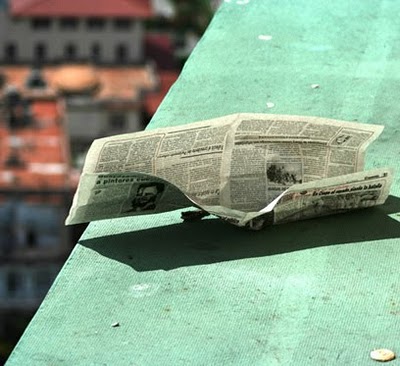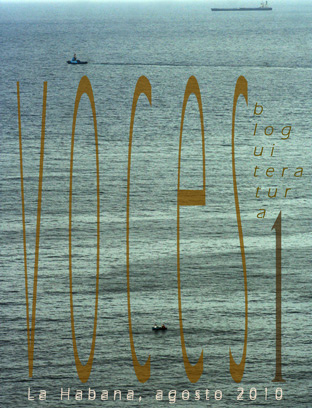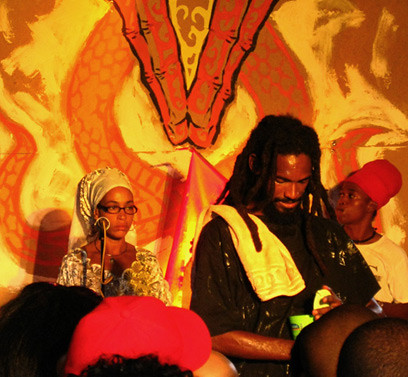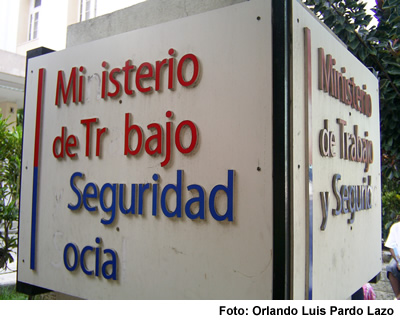Today, when I should be publishing the last part of my articles about Cuban journalism, an emotional inability cut short my intention. Because to speak, at this time, about something else other than the lamentable events happening in the city of the national anthem, the contaminated atmosphere of pain that falls today over Bayamo’s fiery summer, is to be a traitor to what it means to be a chronicler in my blog.
The small town I live in is covered in gray. The iron gray of violence. It is a terrorized city in waiting, one whose nerves have not known peace for a long time.
It all began with a death.
As always, a death impossible to accept. This one, most of all: the death of a child, a 13-year-old girl.
Her little body was found a couple of months ago in the bushes, lacerated, where it lay for days, subject to insects and decomposition. A small prostitute who died in a rented room, victim of an overdose of drugs forced on her by an Italian tourist.
Her story unnerved all the good people of this city. It hurt us, wounded us, we who above all base our lives and behavior on the idea of humanism. Her destination (taken in a car, at midnight, abandoned by the tourist and Cuban accomplices to the mercy of scavenging dogs and vultures in some desolate place), filled us with horror when we learned of it, especially because of her young age.
When she was discovered and photographed by the police team, she was still wearing the yellow skirt of her school uniform.
The authorities took several weeks to find the culprits. The arrests followed, one after another, endlessly. Too many well known names were implicated in one way or another in the homicide. Those who have lived in provincial towns understand how explosive such a case can be in such a confined environment where everything becomes known.
As for the perpetrators, they put them behind bars. Those directly responsible, those indirectly, those suspected, and those presumed to have knowledge of the crime. The squeal of the tires, the wail of the police cars, were repeated in different parts of the city, at any hour, any house.
Then the deadly insecurity struck. Even today.
Because still, at the very moment I write with sincere unease, the arrests have not stopped, the operations, the deployment of soldiers that are obviously intended to extend justice, even beyond the point where I don’t know if I should support it. I am referring to a social lesson.
It happens that a sad reality has been brought to light from the depths of the case. A reality where several children, underage, have sold their prepubescent bodies to depraved tourists who at the very least inspire contempt and disgust. A panorama where it has now been proved that some relatives have been involved, including mothers, who knowing what lucrative merchandise is represented by the waists of their daughters, ironed their clothes and delivered them freshly bathed to the highest bidder.
But there is more filth in this sea.
Because there are so many arrests that we now suspect a social mercilessness, a raging river that at this point doesn’t pretend to punish those guilty of these horrible crimes, but leads us to think of strategies of another kind and another wickedness.
A strategy that takes advantage of favorable public opinion to mercilessly sweep away the few wealthy in a city that is by definition poor, people who have had little or nothing to do with criminal acts of this nature. It is about, obviously, ending the economic prosperity of a few whose guilt cannot be established with any certainty, and may be entirely fabricated.
I am speaking of the owners of Homes for Rent.
The young girl died in one of these central and comfortable houses which tourists often choose over the State-owned hotels. The involvement of the landlord, who allowed an Italian to entertain a Cuban minor, is something we cannot yet know; fortunately, we are only spectators.
But we do know the arguments they have used to justify, for days now, having arrested another four homeowners of Homes for Rent at five in the morning, in an operation that paralyzed, shocked and frightened the city.
The arrested, on this occasion, were men and women (including those of advanced age and with severe illnesses) who, save specific exceptions, have until this very second maintained an immaculate social status.
I cannot judge the depth. I simply immerse myself in the reality that surrounds us, and from which it is impossible to escape. But what took place last Tuesday morning, in this city of history and celebration, I cannot accept as a fate for anyone else. I don’t believe it to be healthy for the social environment that already lacks the oxygen of peace.
Before daybreak the trucks and trailers stopped in unison, in front of five of these private hostels. Hundreds of soldiers blocked off the nearby streets, avenues and parks. The residents of these areas awoke in the middle of disturbing noises about which they had no idea where they were coming from.
In the middle of the day they were still loading a mountain of possessions on the trailers. They seized everything.
Twin beds and refrigerators. Plastic chairs and wooden chairs. Full-length mirrors, dining tables, copies of paintings in wrought iron frames. A sports jeep that they hooked to the back of a trailer. Antiques preserved as ancestral relics, modern air conditioners. Hundreds, thousands of items that they emptied from the interiors of the houses leaving a dizzying silence.
Five families have just lost their patrimony, assembled over decades of inheritance and purchase, sacrifice and privation, legal and illegal business dealings, everything they had managed to collect as their own. And most incredible: all this without yet having gone to trial.
I don’t know the true extent of their responsibility, and I refuse to make too many categorical judgments that may ultimately prove to be unfounded. But I dare to dust off the French Revolution where the “Incorruptible Maximilien Robespierre” established his regime of terror on the pretext of supposed equality and social justice.
I also dare to dust off the words of another Frenchman, the infamous Joseph Fouché, when he affirmed with pleasure in his writings, “Here, to be rich makes one blush,” words that his biographer Stefan Zweig belied saying that, in truth, he should have said, “Here, it terrorizes one to be rich, because of the bloody actions suffered by those who are presumed to have accumulated more than anyone else.”
What are the social consequences of this crusade against crimes that, to naive minds, cross the boundaries of what must be penalized and confuse that with opportunistic strategies of the State? This I cannot know, nor can anyone around me.
This time, I confess, that the analysis required exceeds my intellect, and I declare myself one more spectator without a solid opinion.
But at the same time, I can’t not raise my voice, which is also that of an entire city: a cry that is a white flag for the authorities of this town.
I can’t not say that with this social instability, this perverted atmosphere of fear, of agitation, of not knowing when it will be time to flee from a crime you didn’t commit, but which may arise suddenly; in this atmosphere of a surrealist film where anything is possible, the honest people of Bayamo no longer want to live.
Let me repeat that anything is possible. Yes. It is possible, for example, that traveling from computer to computer, from flash memory to DVD, are the horrific images of the body found in her school uniform skirt, and even more horrible, the video of her autopsy. Both filtered out through the hands of the investigation itself, to the general population.
Too many times I have had to reject, indignantly, the offer from someone to show me this evidence to satisfy an alleged curiosity. Morbid curiosity is one of the human deviations that I have most learned to detest.
I know that in such a climate it is impossible to bear up. I know that the dialectic will be diluted at some point in this nightmare, which, unfortunately, many will continue to suffer for far too long. The guilty along with the innocent. The criminals whose punishment will never be sufficient to pay for this act, as well as those unjustly caught in this web of judicial opportunism.
But from my humble position as a writer who has never ceased to be aware of the danger, and of the excesses of those who enforce the law at their own will, I hope that my beloved Bayamo will wake from this social nightmare in which we have been plunged for several months.
August 28, 2010
 If Chilean businessman Joel Max Marambio Rodríguez does not appear before the Inspector from the Ministry of Interior, Lieutenant Colonel Francisco Miguel Estrada Portales, this 23rd of August (the deadline specified in an indictment), the criminal proceedings initiated against him could proceed to a final judgment of guilt.
If Chilean businessman Joel Max Marambio Rodríguez does not appear before the Inspector from the Ministry of Interior, Lieutenant Colonel Francisco Miguel Estrada Portales, this 23rd of August (the deadline specified in an indictment), the criminal proceedings initiated against him could proceed to a final judgment of guilt.
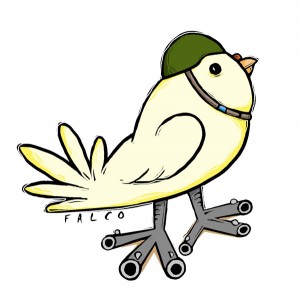 On Saturday, August 7, Cuban television aired another chapter in the media tragicomedy of Fidel Castro Ruz, who chaired the special session of the so-called People’s Power National Assembly, to which he spoke about the disaster that will be triggered in the Persian Gulf if the U.S. government dares to underestimate the threats of Iran, whose government is developing a plan of nuclear weapons, destabilizing the region.
On Saturday, August 7, Cuban television aired another chapter in the media tragicomedy of Fidel Castro Ruz, who chaired the special session of the so-called People’s Power National Assembly, to which he spoke about the disaster that will be triggered in the Persian Gulf if the U.S. government dares to underestimate the threats of Iran, whose government is developing a plan of nuclear weapons, destabilizing the region.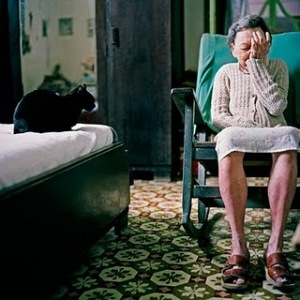 Photo: Karen Miranda
Photo: Karen Miranda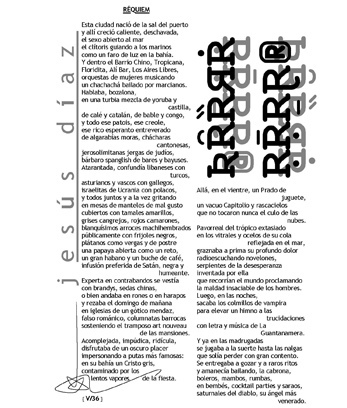
 Photo: Luis Felipe Rojas
Photo: Luis Felipe Rojas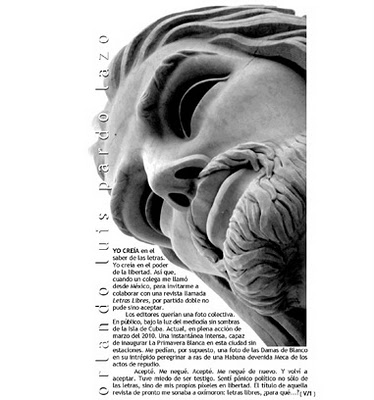
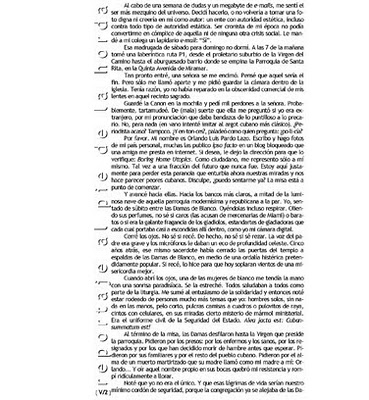
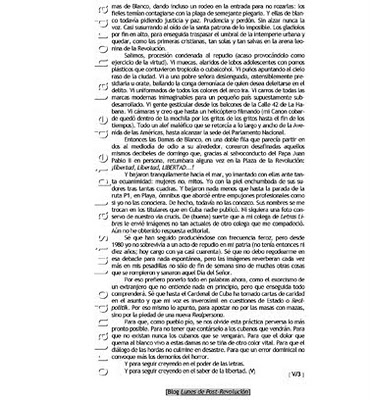
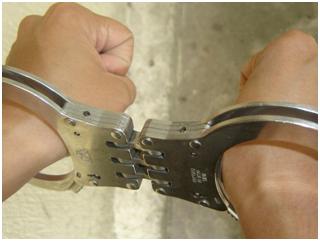 After his speech before the National Assembly, in which Raul Castro warned that “there will be no impunity for the enemies of the homeland,” the repressive and intimidating actions against opponents have intensified.
After his speech before the National Assembly, in which Raul Castro warned that “there will be no impunity for the enemies of the homeland,” the repressive and intimidating actions against opponents have intensified.

